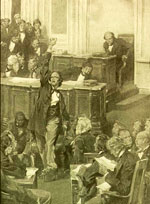The Harriet Beecher Stowe House is operated as an historical and cultural site, focusing on Harriet Beecher Stowe, author of Uncle Tom's Cabin. The site also includes a look into the family, friends, and colleagues of the Beecher-Stowe family; Lane Seminary; and the abolitionist, women's rights, and Underground Railroad movements in which these historical figures participated in the 1830s to 1860s, as well as African-American history related to these movements. The house was home to Harriet Beecher Stowe prior to her marriage and to her father, Rev. Lyman Beecher, and his large family, a prolific group of religious leaders, educators, writers, and antislavery and women's rights advocates. The Beecher family includes Harriet's sister, Catherine Beecher, an early female educator and writer who helped found numerous high schools and colleges for women; brother Rev. Henry Ward Beecher, a leader of the women's suffrage movement and considered by some to be the most eloquent minister of his time; General James Beecher, a Civil War general who commanded the first African-American troops in the Union Army recruited from the South; and sister Isabella Beecher Hooker, a women's rights advocate. The Beechers lived in Cincinnati for nearly 20 years, from 1832 to the early 1850s, before returning East.
The house offers exhibits, tours, and occasional recreational and educational programs and events.


